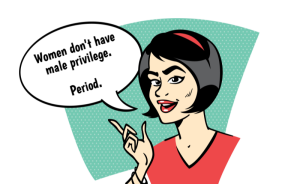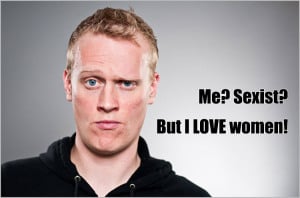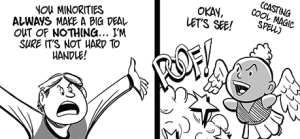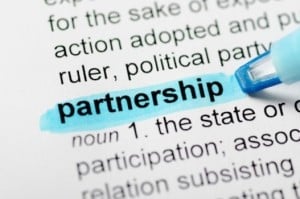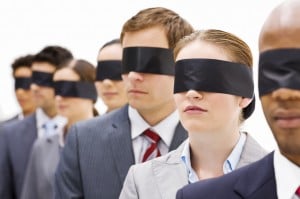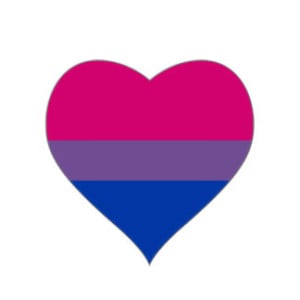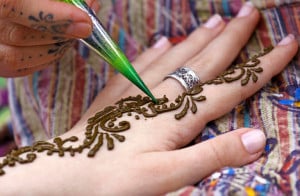
A person by a subway station with their arms folded looking into the camera.
When the entire world tells you that you’re inferior, it’s hard not to start believing it – even at some subconscious level.
This is especially true for people from marginalized groups. Often, the media, the government, legal systems, and our communities treat us as inferior, leading us to feel like we truly are inferior.
This is what we call internalized oppression. When it comes to women who believe they are inferior to men, we call it internalized misogyny.
Internalized misogyny shows up in many ways, including in saying harmful things about other women, as well as doubting yourself because of your gender.
Having internalized misogyny is a natural response to a harmful society. By this, I mean that internalized misogyny doesn’t mean you’re a bad person – it just means you have some healing to do.
Personally, I used to say and think so many misogynistic things, especially when I was in high school, without even realizing how problematic my thought process was. It takes a long time to heal from this sort of mentality.
But in order to challenge the patriarchy, we have to be willing to recognize how the patriarchy affects our thoughts and actions.
To heal from internalized misogyny, we first have to recognize how it manifests. So let’s take a look at a few misogynistic phrases and why we should avoid using them in future.
1. ‘I’m Not Like Other Girls’
I said this phrase so often in high school.
I’d like to think I was referring to the fact that I was queer, and thus different to most of my heterosexual classmates, but it honestly came from a deep place of girl-hate.
When we proudly exclaim that we’re different from “other girls,” we imply that those “other girls” are inferior in some ways.
Differentiating yourself from a group, and saying, “Hold up! I’m not with them!” implies that being a part of that group is a bad thing.
But hold up. Let’s think about this a little more.
Of course, no girl is like other girls. No person from any group is like anyone else from that group, because no group is a monolith. Every single girl will differ to every other girl in some way, based on their experiences, hobbies, preferences, and beliefs.
Sometimes, I really feel like the phrase “I’m not like other girls” is informed by the idea that girls are usually all the same. It buys into the idea that gender stereotypes are true – especially since we often say the phrase before we describe ourselves as having traditionally “unfeminine” traits.
For example, people often might say something like, “I’m not like most girls. I like soccer.” Or they might say, “I’m not like most women. I’m quite a deep, thoughtful person.” This implies that the vast majority of women or girls dislike sports or are shallow and superficial.
And given the way the media presents women, it’s unsurprising that so many of us believe these stereotypes.
At the end of the day, we should be proud to be like other girls. Girls are the bomb.
2. ‘I Would Rather Hang Out with Boys Than Girls – Girls Are So Much Drama!’
This is similar to the first phrase I mentioned: It shows how some of us don’t want to associate with other women, because we believe women are inferior.
When we say that being friends with women is “dramatic,” it’s not just a generalization. This phrase reflects a really harmful stereotype: the notion that women are overdramatic and men are logical and calm.
It’s harmful to characterize women as illogical. Not only does it mean we take women less seriously than men, it’s also used to justify the idea that women are naturally bad at science, math, and technology, and that we’re better suited to do traditionally “feminine” tasks that involve nurturing and aren’t thought to involve mathematical or scientific skill.
While there’s nothing wrong with traditionally feminine careers and behavior, implying that it’s all a woman should do means we’re limited.
The widespread idea of women as overdramatic makes it easier for men to gaslight us when we speak out about our oppression, as our anger towards sexism is dismissed as exaggerations of the truth.
3. ‘Unlike Other Women, I Have Morals’
One way the patriarchy controls women – and often femme-identifying people – is through policing their sexuality.
We prescribe how, when, where, and with whom women should have sex, and we shun women who demonstrate autonomy and sexual agency. This implies that our bodies are not our own, but rather public entities other people are entitled to judge.
Sex-shaming is, sadly, something many of us women do to one another. We sometimes compare ourselves to other women in order to look superior, which here implies that our value is tied to our sexual behavior.
The thing is, it’s not our business what other women do with their bodies, as long as it doesn’t directly interfere with our rights.
Reducing a woman’s morality to how much sex she has is nothing short of policing her sexuality. In a society where our bodily autonomy is commonly disrespected, we need to support women’s choices over their own bodies.
Women who want to sleep around? Support them.
Women who only want to sleep with one person at a time? Support them.
Women who only want to have sex after getting married? Support them.
Women who never want to have sex, ever? Support them.
Rather than criticizing women for having sex, we should criticize society for shaming people based on their sexual behavior.
4. ‘Real Women _______’
I’ve already written about the perils of the phrase “real men don’t rape.” But saying that “real women” do or don’t do something is just as harmful.
Often, the phrase is used to praise women who behave as they’re traditionally expected to behave. It’s used to reinforce the idea that women must be nurturing, well-dressed, and in a monogamous relationship with a man.
Once again, this buys into harmful stereotypes. It limits women who don’t fit that prescribed idea about what a woman is and how we should act.
“Real women have curves” is a common phrase that’s meant to be body-positive. But it doesn’t include fat women who aren’t curvy in societally acceptable ways (for example, those that don’t have hourglass figure).
Saying that real women have curves also reflects cissexist beauty standards, because women with stockier, less curvy bodies are seen as “masculine” and thus unattractive. This can also affect trans women in especially harmful ways.
Real women identify as women. That’s it. That’s all. Beyond that, women are diverse in their appearances, preferences, beliefs, attitudes, and behavior – and none of those things can cancel out their identity as women.
Reducing women to whether they have curves, vaginas, or children – or not – is pretty simplistic and misogynistic.
***
Given the way society treats women, it’s no surprise that many of us say harmful things about ourselves and one another.
But that doesn’t make it okay to say these things when we know better.
Together, let’s try to eliminate these problematic statements from our vocabulary and confront internalized misogyny head-on.
After all, we can only properly heal from sexism and kick patriarchal ass when all women (and non-binary folk!) are united and ready to support one another.
[do_widget id=’text-101′]
Sian Ferguson is a Contributing Writer at Everyday Feminism and a queer, polyamorous, South African feminist who is currently studying towards a Bachelor of Arts majoring in English and Anthropology. Originally from Cape Town, she now studies at Rhodes University in Grahamstown, where she works as vice-chair of the Gender Action Project. She has been featured as a guest writer on websites such as Women24 and Foxy Box, while also writing for her personal blog. Follow her on Twitter @sianfergs. Read her articles here.
Search our 3000+ articles!
Read our articles about:
Our online racial justice training
Used by hundreds of universities, non-profits, and businesses.
Click to learn more





